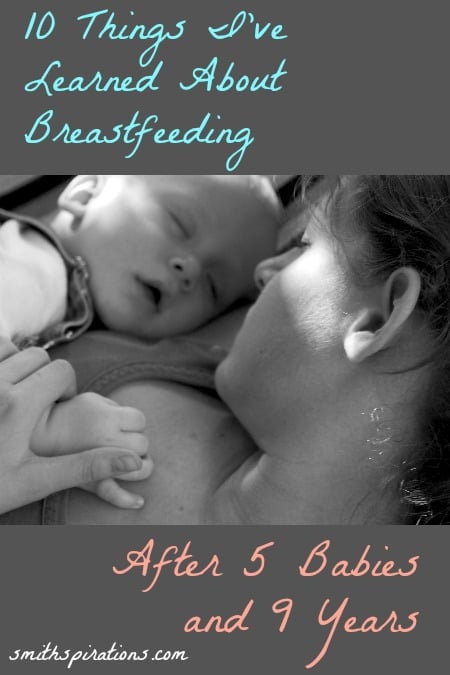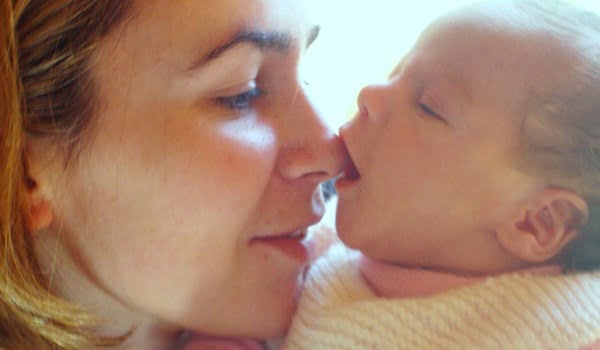I don’t really consider myself a veteran mom. Honestly, I couldn’t. I have yet to venture into the waters of raising teenagers, so I fully realize that I have much to learn yet as a parent. However, after nine years of almost continual breastfeeding, I do have a bit of breastfeeding experience under my proverbial belt.

In those nine years, I’ve learned some important lessons about breastfeeding that I want to share with you today. Some may be obvious to you, some may be surprising, and I hope that at least a couple of them are helpful.
This post contains affiliate links. Purchases made through these links come at no additional cost to you but can bless our family with a small commission. Thank you for your support!
1. Your Health Care Professional May Not Be the Best Source of Information
We commonly hear the phrase Doctor knows best, but I quickly learned that this is not always the case. With my first baby, a pediatrician told me at two weeks to feed her less. She was gaining weight “too quickly.” Every ounce of mothering common sense told me that was crazy, so I smiled, nodded my head, and ignored his advice.
Depending on when your health care professional went through his or her training, he or she may have had little to no actual training in breastfeeding. Never be afraid to compare the doctor’s advice with that of well-respected breastfeeding advocacy groups, websites, or local support persons.
2. Breastfeeding Doesn’t Have to Hurt at First
I spent the first three weeks breastfeeding my first baby with my toes curled under in pain. It hurt terribly! I had been told during pregnancy by older women that it just would hurt for a while, and then I’d get used to it.
Once I started reading and learning more, though, I learned that in almost every case, so long as baby is latched on well, there shouldn’t be any pain while breastfeeding. A little soreness might be expected, but pain typically means that something needs corrected.

3. It Is Okay to Let Someone Watch You Nurse Your Baby When You Need Help
While I was going through those agonizing three weeks, I wanted to figure out the problem, but I wanted to do so myself. Why? Because I was terribly bashful about letting another woman see my breast or watch me try to get my baby to latch on.
Looking back I really wish I would have realized that it is perfectly fine to let a lactation consultant, La Leche League leader, or similar person watch me breastfeed. They know what to look for, what to suggest, and how to get a more comfortable latch.
4. Breastfeeding Support Groups Are for More Than Just Breastfeeding
If you’re looking for a good pediatrician or family doctor for your baby, a local breastfeeding support group can be one of the best places to find recommendations! Along with those suggestions, you can find all sorts of helpful advice on other breastfeeding issues like introducing solids, potty training, diapering, and sleep habits.

5. Your Baby Doesn’t Care What Time It Is
Your baby doesn’t care if it is 2 in the afternoon or 2 in the morning. Only one thing matters when that little baby needs you, and that is having his little needs met.
Some babies will do better with more structured routines, but strict schedules outlining when it is time to eat can really harm a breastfeeding relationship, especially in the early weeks and months. Feeding on demand isn’t really about anyone demanding anything, but being sensitive to a baby’s very real need for comfort, food, and love.
6. Your Baby Will Not Always Nurse to Sleep
Ahh, yet, another issue that I worried myself sick over with my first. I read way too many parenting magazines and felt that by a certain age, I shouldn’t let my baby nurse to sleep. Ever. It would certainly result in horrible sleep habits for the rest of her life.
This one took me way to long to catch on to, but your baby will not always nurse to sleep. Some little ones do just fine without breastfeeding to sleep, but some can’t fall asleep without it. Don’t worry. They do grow out of it, and they’ll sleep just fine eventually.
7. It Is Okay to Let Your Baby Nurse for Comfort
Going right along with the above lesson, it’s also perfectly fine to let your little baby nurse for comfort even when you know they aren’t hungry. Breastfeeding is wonderfully calming for little ones who are learning so much in this new, big world of theirs.
If you find it helpful to let your baby nurse for comfort, then by all means, do it. They will learn to self-sooth when their minds have matured more. I’ve found breastfeeding to be one of the most helpful tools I can use for a baby who is hurt or overwhelmed. I’m thrilled to have a cure-all at my disposal!
8. It Is Completely Normal and Okay to Get Tired of Breastfeeding
I won’t lie. When my babies become toddlers (I usually nurse them for around two years), I get to a point when I sometimes just don’t enjoy breastfeeding as much as I used to. I crave personal space, a little more freedom, and a decent selection of shirts that don’t have their neck lines or bottom hems stretched out.
That doesn’t mean that I jump into the weaning process, though. Just knowing that it is normal and okay to feel that way makes a big difference for me. A little time out of the house by myself doesn’t hurt, either.
9. Most of The Time, It’s All About Supply & Demand
I completely realize that there are situations when moms have very legitimate issues with milk supply. However, in most cases, the more you nurse your baby, the more milk your body makes. It really is all about supply and demand.
If for some reason the supply isn’t keeping up with the demand, I always consider how much water I’ve been drinking, how much sleep I’ve been getting, and what kind of diet I’ve been eating. Usually, if my supply feels sluggish, I’m tired and dehydrated. Drinking more water, taking a nap, and nursing the baby more brings it back up in a day or so.
10. Every Little Bit Counts
A precious friend of mine has been unable to fully breastfeed her children. She is one of the few women who have real supply issues, despite supplements, extra pumping, and help from a lactation consultant. But I have always admired how she will pump for days to be able to give even just a little bit of breast milk to her babies in the early months.
Every little bit counts. If you’re in her situation, be encouraged with the best you can do, momma! God will bless your heart and your efforts.
Want More Tips on Breastfeeding?
I teamed up with other contributors from Breastfeeding Place to write an ebook called The Breastfeeding Lifeline. It’s all about helping moms navigate the early months of breastfeeding. I know how rough they can be and how much of a help it was when someone came along side of me to offer advice and encouragement.
You’ll find my name on the chapters dealing with recovery after birth and nourishment while breastfeeding. Be sure to check out this great resource!
What lessons from experience would you share on breastfeeding? Do any of these surprise you?
Original article and pictures take abetterwaytothrive.com site
Комментариев нет:
Отправить комментарий